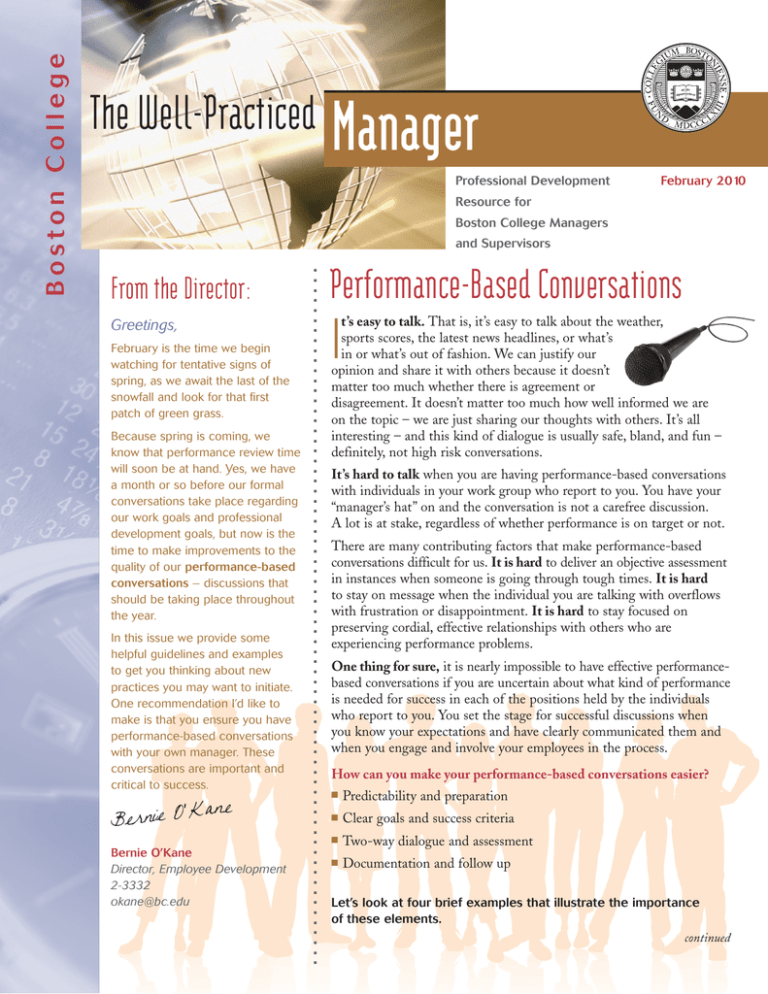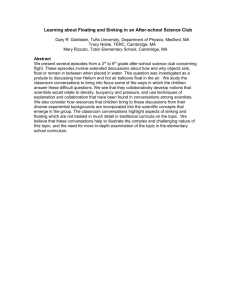Manager I The Well-Practiced
advertisement

Boston College The Well-Practiced Manager Professional Development February 2010 Resource for Boston College Managers and Supervisors ■ From the Director: ■ ■ ■ Performance-Based Conversations ■ Greetings, ■ ■ ■ February is the time we begin watching for tentative signs of spring, as we await the last of the snowfall and look for that first patch of green grass. Because spring is coming, we know that performance review time will soon be at hand. Yes, we have a month or so before our formal conversations take place regarding our work goals and professional development goals, but now is the time to make improvements to the quality of our performance-based conversations – discussions that should be taking place throughout the year. In this issue we provide some helpful guidelines and examples to get you thinking about new practices you may want to initiate. One recommendation I’d like to make is that you ensure you have performance-based conversations with your own manager. These conversations are important and critical to success. ane Bernie O’K ■ ■ ■ ■ ■ ■ ■ ■ ■ ■ ■ ■ ■ ■ ■ ■ ■ ■ ■ ■ ■ ■ ■ ■ ■ ■ ■ ■ ■ ■ ■ ■ ■ ■ ■ ■ ■ ■ ■ ■ ■ I It’s hard to talk when you are having performance-based conversations with individuals in your work group who report to you. You have your “manager’s hat” on and the conversation is not a carefree discussion. A lot is at stake, regardless of whether performance is on target or not. There are many contributing factors that make performance-based conversations difficult for us. It is hard to deliver an objective assessment in instances when someone is going through tough times. It is hard to stay on message when the individual you are talking with overflows with frustration or disappointment. It is hard to stay focused on preserving cordial, effective relationships with others who are experiencing performance problems. One thing for sure, it is nearly impossible to have effective performancebased conversations if you are uncertain about what kind of performance is needed for success in each of the positions held by the individuals who report to you. You set the stage for successful discussions when you know your expectations and have clearly communicated them and when you engage and involve your employees in the process. ■ ■ ■ ■ ■ ■ ■ ■ ■ Bernie O’Kane Director, Employee Development 2-3332 okane@bc.edu t’s easy to talk. That is, it’s easy to talk about the weather, sports scores, the latest news headlines, or what’s in or what’s out of fashion. We can justify our opinion and share it with others because it doesn’t matter too much whether there is agreement or disagreement. It doesn’t matter too much how well informed we are on the topic – we are just sharing our thoughts with others. It’s all interesting – and this kind of dialogue is usually safe, bland, and fun – definitely, not high risk conversations. How can you make your performance-based conversations easier? ■ Predictability and preparation ■ Clear goals and success criteria ■ Two-way dialogue and assessment ■ Documentation and follow up ■ ■ ■ ■ ■ ■ ■ ■ ■ ■ ■ ■ Let’s look at four brief examples that illustrate the importance of these elements. continued ■ ■ ■ ■ ■ ■ ■ ■ ■ ■ ■ ■ Predictability and Preparation Karen has finally decided to act. She calls Bill into her office and begins to give him feedback on his performance. Karen finally worked up the courage to take the initiative and let Bill know that he wasn’t meeting her expectations. ■ ■ ■ ■ ■ Tw o - w a y d i a l o g u e ■ ■ ■ ■ ■ What’s wrong with Karen’s action? • Karen didn’t prepare herself – she acted impulsively; her words were not careful and well planned ■ ■ • Bill felt like he was ambushed • Karen missed the opportunity to bring out the best in Bill • Identify specific success criteria for outcomes Performance-based conversations are far too important to hold on the spur of the moment. Karen needs to schedule these discussions on a predictable basis – so that both she and Bill are prepared and ready. Karen’s preparation should include reviewing her notes about Bill’s current performance and determining her key questions and feedback. She needs to listen to Bill to get his perspective for a meaningful two-way dialogue about performance. • Have regular performance-based conversations with individuals ■ ■ ■ ■ ■ ■ ■ ■ ■ ■ ■ ■ ■ ■ ■ ■ ■ ■ ■ What does Jeff need to do? • Sharpen up the goals for the team and for individuals on the team ■ ■ Clear Goals and Success Criteria Jeff is a hands-off manager. When talking with members of his work group, Jeff tends to speak in generalities: “Do the best you can,” and, “Nice work.” When it becomes evident to him that a project he delegated to the team is not making much progress, Jeff is disappointed. • Hold individuals and the team accountable for results • Find out what support or training may be needed and provide it Clear goals and success criteria move people in the right direction. Without definition and clarity, work stalls because people get sidetracked. Effective managers single out high priorities, monitor progress, provide guidance, and ensure good outcomes. Two-way Dialogue and Assessment Stephen does many things well. He holds regular meetings with each person in his work group and gives individualized performance feedback to them. He delineates his expectations and, typically, they are met. But Stephen is missing an important opportunity to maximize performance – he hasn’t involved people in evaluating their own work. What might Stephen do? • Collaborate with individuals on meaningful success criteria for them • Jointly evaluate their performance against objective criteria • Partner with individuals to identify further challenges for professional growth Employee Development Office Department of Human Resources More Hall 315 617.552.8532 employee.development@bc.edu www.bc.edu/ed With these small, significant shifts Stephen will bring out the best in people by engaging them in a two-way dialogue and assessment of their own performance. His job becomes easier and the individuals in his work group have more control and a bigger stake in their work life. continued Documentation and Follow Up Sylvia is an ace at straight talk about performance. She knows how to motivate individuals and makes the time to cultivate the skills and abilities of each person in her work group. Sylvia develops people. What’s her secret? The elements of Sylvia’s success with her work group: • Create a current performance file for each person every year. Success • In the file, keep current notes about conversations, performance, challenges, and accomplishments • Hold 30-minute monthly meetings with each person in her work group; consider these meetings essential. • Set aside 15 minutes prior to each meeting to review notes in the current folder and prepare for the meeting. • Expect a two-way dialogue about performance; expect people to be prepared for these meetings. • Let people know what you value; thank them for their participation and results achieved. • Set aside 15 minutes following each meeting to make notes about the meeting. • Put follow up action into her calendar. • Confirm agreements made in a follow-up email. Sylvia estimates that it takes her about one hour per month per employee to follow these steps. Documentation and follow up make the difference between good intentions and good results. Managers are responsible for good results. Performance-based conversations are critical conversations that become easier when you have a framework around them. Develop your own signature framework – one that gets you the very best results – and use that framework with consistency. Editorial Services provided by Nancy Sartanowicz, Workplace Strategies, www.yourstrategies.com Graphic Design by Tania Fine Helhoski, BirdDesign, www.birddesignstudio.com



